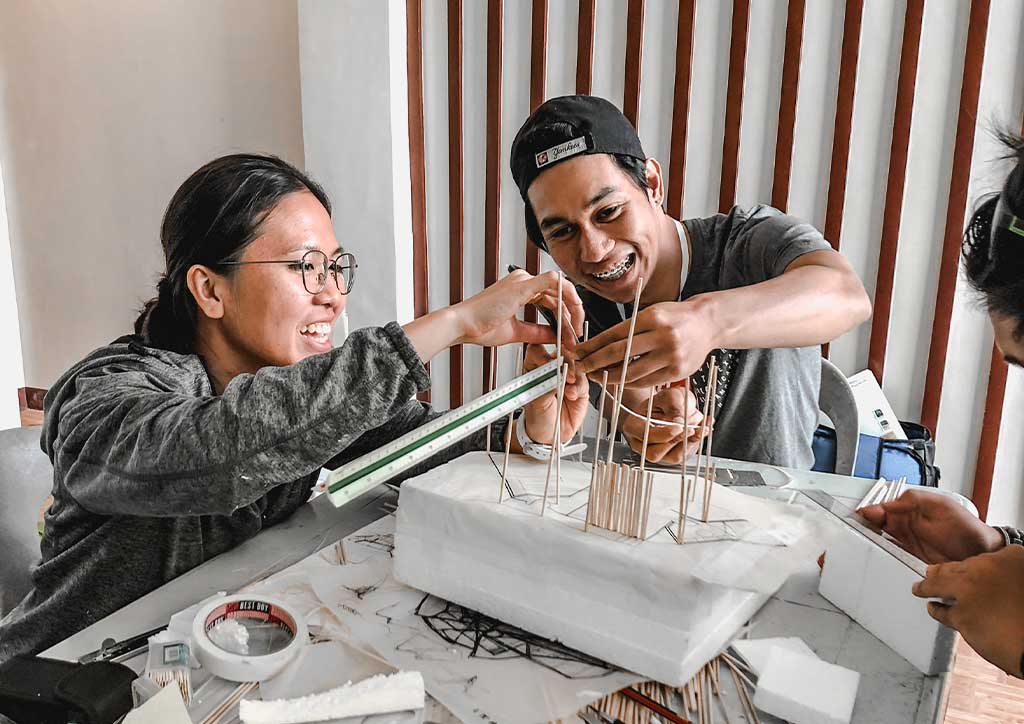
Women Run Design: How Jumax Morgia walked away from and ran back to architecture
What I like most about personal interviews is that they establish a feeling, an emotion that resonates throughout the entire conversation. While it was only an exchange of emails and messages with Cebu-based architect Jumax Morgia, reading through her answers felt like she was narrating her story and communicating her thoughts as if she was in front of me. It was a personal interview, figuratively. Behind a thousand of her words and a cursor lies the strong heart of a woman who grew up in, worked through, and continues to progress in architecture.
Her yesteryears
Architect Jumax Morgia grew up in a house right next to their family’s shop and furniture factory. “While everyone else had Barbie dolls and dollhouses, I made toy guns from scrap metal at our shop for my little brother,” she recalls. “I grew up listening to the sound of welding machines buzzing, wrought iron being pounded to all sorts of forms, and paint being sprayed on furniture, 24/7. It was my lullaby.” She mentioned her father who never ran out of ideas, dabbling into all sorts of creative fields and crafting as many pieces as he can. “He made everything from foldable metal armchairs long before they were even a thing, harvest fuel from plastics, made new materials out of old trash, and even advised one of my classmates’ thesis!” she continues, reminiscing the very moments that she never thought would make such great influence to her life choices.
In college, Jumax Morgia naturally took up BS Architecture at the University of San Carlos. Among her very few lady professors, she cited Architect Margaret Rosario, who is now the Dean of the College of Architecture and Fine Arts in the same school. “She was my interior design elective professor. I sat right in front of her during class and she would take time to talk to me,” Morgia narrates. She describes her first few days in college as a “shock,” especially because she came from an all-girl Catholic high school, and her chosen program was very male-dominated. Architect Jumax Morgia says that her education did not at all influence her design philosophy, and that like many other architecture students, studying felt more like simply trying to survive. “I also did not have a design mentor post-college, so my love for architecture sort of took a pause after that,” she tells.


Getting back on track
“When I decided I wanted to become an architect and finally take my board exams, I was 10 years late, but I jumped in and did it anyway,” Morgia says. She revisited almost a decade working in the BPO industry and how the managing skills she learned from there actually helped her easily go back to her first love. The decision called for impulsive yet significant actions that later on gave her memories and experiences that personally and professionally brought her to where she is now. She became zubu design associates’ Managing Partner for three years, walking through the curves and slowly refamiliarizing herself with the industry that she most missed. Jumax Morgia says that she is extremely grateful for zubu design associates’ principal architect Buck Sia who taught her plenty of what she knows now. “Him, along with AJ Javier of Javier Design Studio Manila are the people I consider my mentors in this industry. I also have the rest of SPAM and my architect friends in Cebu. We like sharing notes about things that challenge us at work, and I try to share what I can too about operations and performance management for people in the creative industry,” she reveals, emphasizing that having driven and passionate friends in the industry will always encourage you to keep up and be better each passing moment.


‘Architecture is not for women’
“There was one male architect who told me that he does not believe that architecture is for women. And no matter how politely he seemed to say it, it left me to believe that the choice to be conservative, ignorant, and rude is a choice other people make. I really don’t have control over it. What I do have control over is how hard I work, or how many times I get up and try again when things get really tough, or how I can walk away from battles that I choose not to fight,” Architect Jumax Morgia shares when asked whether the architecture industry has blurred the lines between men and women. From this statement, the mixture of intensity and sincerity in all her answers I read became more relevant. It was then I knew that like many women in our time, Architect Jumax Morgia was once wounded through discriminative words, but like how many others did and continue to do, she too, translated the words into a reminder of what she can and must do as a woman.

Architect Jumax Morgia believes that in any industry, a woman’s empathy will always be needed. “With how the times are rolling, empathy is a much needed yet a very undervalued soft skill in business. It allows leaders to understand the root cause behind poor performance better and allows teams to work together towards solutions to issues at work,” she underscores. “It requires putting others ahead of yourself as you try to understand someone else, and most women I know do not have a problem with this. I am not saying that men don’t have this skill, but women, through time, have executed empathy better than men.”
Towards the end of reading all her answers, the architect called to women and encouraged them to get rid of the “LADY DRIVER” sticker at the back of their cars. She says that if women want to be treated as equals, they should be willing to give up some perks of being a woman. “If a guy would tell you he thinks that architecture is not a woman’s world, give him a big smile and tell him his opinion does not matter. Because it doesn’t,” she says firmly. “Being brave doesn’t necessarily mean the ability to show the most brawn and to be the one to scream the loudest. Often times, it is the ability to get up, and meeting every day with a woman’s quiet grace that truly inspires.” Moreover, she also addressed the men saying: “Just because women demand to be treated equally, it does not mean you allow ladies to carry heavy stuff, or don’t open doors for them. Honor your mothers. How you treat women is a reflection of how your parents have raised you.”
Part of what we sent to Architect Jumax Morgia is to complete this sentence: “Being a woman in a man’s world is _____.” Her reaction to this leaves a message that should never be neglected. “As Beyonce would say: Girls run the world. So, whose world are you talking about again?”
READ MORE: Wonder Women: The 5 female Pritzker Prize Laureates since 1979
Images courtesy of Yssa Canama


